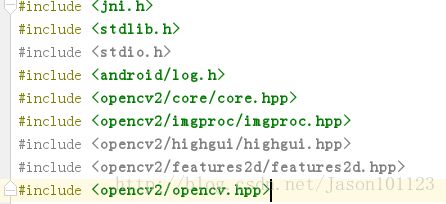Android Jni OpenCV-基于ORB算法特征点匹配
一,java代码,收集Bitmap 信息
public class MainActivity extends AppCompatActivity implements View.OnClickListener {
private Button btnProc;
private ImageView imageView;
private Bitmap bmp;
// Used to load the 'native-lib' library on application startup.
static {
System.loadLibrary("native-lib");
}
@Override
protected void onCreate(Bundle savedInstanceState) {
super.onCreate(savedInstanceState);
setContentView(R.layout.activity_main);
// Example of a call to a native method
btnProc = (Button) findViewById(R.id.btn_gray_process);
imageView = (ImageView) findViewById(R.id.image_view);
bmp = BitmapFactory.decodeResource(getResources(), R.drawable.test7);
imageView.setImageBitmap(bmp);
btnProc.setOnClickListener(this);
}
/**
* A native method that is implemented by the 'native-lib' native library,
* which is packaged with this application.
*/
public static native int[] grayProc(int[] pixels, int w, int h);
@Override
public void onClick(View view) {
int w = bmp.getWidth();
int h = bmp.getHeight();
int[] pixels = new int[w*h];
bmp.getPixels(pixels, 0, w, 0, 0, w, h);
long startTime = System.currentTimeMillis();
int[] resultInt = grayProc(pixels, w, h);
long endTime = System.currentTimeMillis();
Log.e("JNITime",""+(endTime-startTime));
Bitmap resultImg = Bitmap.createBitmap(w, h, Bitmap.Config.ARGB_8888);
//(@ColorInt int[] pixels, int offset, int stride,int x, int y, int width, int height)
resultImg.setPixels(resultInt, 0, w, 0, 0, w, h);
imageView.setImageBitmap(resultImg);
}
}
二,jni实现
using namespace std;
using namespace cv;
void printMAtMessage(Mat &mat);
extern “C”
JNIEXPORT jintArray JNICALL
Java_com_example_dgxq008_opencv_1readpixel_MainActivity_grayProc(JNIEnv *env, jclass type
, jintArray pixels_
, jint w
, jint h) {
jint* pixels = env->GetIntArrayElements(pixels_, NULL);
if (pixels==NULL){
return 0;
}
//图片一进来时是ARGB 通过mat转换BGRA
Mat img(h,w,CV_8UC4,(uchar *)pixels); //pixels 操作的是同一份数据
Mat temp;
//转化为单通道灰度图,并打印信息
cvtColor(img,temp,COLOR_RGBA2GRAY);
vector v;
v.clear();
/*
* ORB算法
* 使用默认构造参数
*
* nfeatures - 最多提取的特征点的数量;
* scaleFactor - 金字塔图像之间的尺度参数,类似于SIFT中的kk;
* nlevels – 高斯金字塔的层数;
* edgeThreshold – 边缘阈值,这个值主要是根据后面的patchSize来定的,靠近边缘
* edgeThreshold以内的像素是不检测特征点的。
* firstLevel - 看过SIFT都知道,我们可以指定第一层的索引值,这里默认为0。
*
* scoreType - 用于对特征点进行排序的算法,你可以选择HARRIS_SCORE,也可以选择
* FAST_SCORE,但是它也只是比前者快一点点而已。
*
* patchSize – 用于计算BIREF描述子的特征点邻域大小。
* */
Ptr orb = ORB::create();
//开始识别
orb->detect(temp, v, cv::Mat());
for (int i = 0; i < v.size(); ++i) {
const KeyPoint& kp = v[i];
/*
* img为源图像指针
* center为画圆的圆心坐标
* radius为圆的半径
* color为设定圆的颜色,规则根据B(蓝)G(绿)R(红)
* thickness 如果是正数,表示组成圆的线条的粗细程度。否则,表示圆是否被填充
* line_type 线条的类型。默认是8
* shift 圆心坐标点和半径值的小数点位数
* */
circle(img, Point(kp.pt.x, kp.pt.y), 5, Scalar(255,10,10,255));
}
printMAtMessage(img);
//对应数据指针
int size = w*h;
jintArray result = env->NewIntArray(size);
env->SetIntArrayRegion(result,0,size,pixels);
env->ReleaseIntArrayElements(pixels_, pixels, 0);
return result;
}
void printMAtMessage(Mat &mat) {
LOGD(“***************************Mat信息开始************************”);
LOGD(“mat.rows %d”,mat.rows);
LOGD(“mat.cols %d”,mat.cols);
LOGD(“mat.total %d”,mat.total());
LOGD(“mat.channels %d”,mat.channels());
LOGD(“mat.depth %d”,mat.depth());
LOGD(“mat.type %d”,mat.type());
LOGD(“mat.flags %d”,mat.flags);
LOGD(“mat.elemSize %d”,mat.elemSize());
LOGD(“mat.elemSize1 %d”,mat.elemSize1());
LOGD(“***************************Mat信息结束************************”);
}
三,效果图

